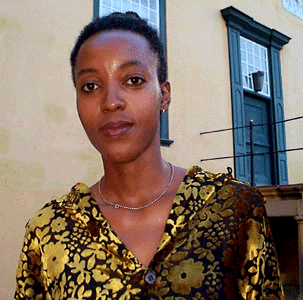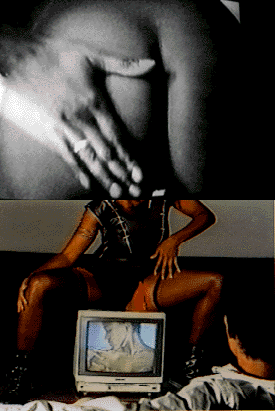 Jocelyn
Taylor . . .
Jocelyn
Taylor . . .
FemmeNoir
A Web Portal For Lesbians Of Color
 Jocelyn
Taylor . . .
Jocelyn
Taylor . . .Jocelyn Taylor is a video artist
from Washington, DC. Her artistic training began in high school
at Duke Ellington School for the Performing Arts where she
studied classical and modern dance forms intensively for four
years. She later attended Northern Virginia Community College
and the Corcoran School of Art in Washington, DC where she
studied photographic media. Upon moving to New York City in
1989, Jocelyn expanded her sense of the visual and the political
as a member of DIVA-TV (Damned Interfering Video Activist
Television), an affinity group of the AIDS activist
organization, ACT-UP (AIDS Coalition to Unleash Power). She was
involved in DIVA TVís collectively produced video, Stop the
Church. In 1990, Jocelyn joined House of Color, a video
collective formed to make images that counteracted
disproportionately exoticized media about lesbians and gays of
non-European backgrounds. She made her first single-channel work
includes, Father Knows Best, 20 min. (1990), Looking for LaBelle,
5 min. (1991), 24 Hours A Day , 9 min. (1993), Frankie & Joice,
19 min. (1994), and Bodily Functions, 15 min (1995). Her video
installations include, Alien at Rest, Deitch Projects, NYC
(1996), Something Private, Franklin Furnace NYC, Museo De Bellas
Artes, Caracas Venezuela (1996 & 1998), Jocelyn on Chair/Eyes in
Bowl Momenta Art, NYC (1997), and Taboo Series # 1, Two Kissing
Women, Rush Art, NYC (1997). Jocelynís work has shown at the
Museum of Modern Art, NYC, San Francisco Museum of Modern Art,
Johannesburg Biennial, South Africa, CURARE in Mexico City and
other national and international venues. Television screenings
of her single-channel work have aired on HBO, PBS, Channel 35/WNYC,
and nationally on public access stations.
Jocelyn began working as the Screening Director for Downtown
Community Television Center in 1993. While at DCTV she organized
publicity and programming for three yearly video festivals as
well as a special weekly series featuring work by women makers,
experimental projects, and video performance artists. Jocelynís
experience in alternative media led her to DYKE-TV, a cable
television program made by, for, and about the lesbian
community. She worked as an anchor for the news segment of the
program and frequently produced calendar and arts segments for
the show from 1994 until 1996. In September of 1995, Jocelyn
coordinated the DYKE-TV television crew for the United Nations
World Conference on Women in Beijing, China.
"Alien at Rest" 1996
Video projection
Jocelyn has lectured on her work at Colgate University in Hamilton, New York, Rutgers University, SUNY New Paltz, and the New School for Social Research among others. Within the art community she has given presentations on her installation work at The Drawing Center, The New Museum, San Francisco Museum of Modern Art, and the College Art Association Conference (Austin, 1994). Jocelyn has taught young people the art of making video for several years. She initially began teaching production workshops for Dyke TV in 1993. Later, she worked with young women at the youth drop-in center, Project Reach, as an artist-in residence during the summer of 1996. She stressed collaboration with the students, encouraging them to trust their own ideas and methods of production. The video, Can You Dig It, an analysis of hip-hop/rap music and itís effects on women, was produced as a result. Jocelyn recently completed a collaboration with students in Miami public high schools as part of the Miami Art Project, a city-wide public art initiative. She guided the students during the creation of eight experimental public service announcements which were shown in the Miami International Airport during the months of January and February of 1998.

Photo Collage
Jocelyn often includes performance in her work and has been invited by her peers to appear in their projects. Among these collaborations are Sluts and Goddesses by Annie Sprinkle, We Interrupt This Program...by Creative Time, and Watermelon Women by Cheryl Dunye. In addition, she has been writing essays about her ideas and work since 1992. Her writing has been published in Outweek, Art Papers, Felix Magazine and SF Cameraworks/The Lab Quarterly Journal. Her essay, "Testimony of a Naked Woman" was published in Afrekete: An Anthology of Black Lesbian Writing (Catherine McKinley, Joyce Delaney, eds. Anchor Books, 1995) and To Be Real: Telling the Truth and Changing the Face of Feminism(Rebecca Walker, ed. Anchor Books, 1996).
Jocelyn was nominated for and received the
Vito Russo Award, a completion grant for artistís
works-in-progress, from the New Festival, a lesbian and gay film
and video festival held yearly at the Public Theater. She has
also been awarded grants from the Jerome Foundation (1994), Art
Matters (1994), the New York State Council for the Arts(1994),
and the National Endowment for the Arts via the Mid-Atlantic
Regional Artist Foundation (1993) and the Virginia Center for
the Creative Arts (1997). In 1994, Jocelyn attended the Whitney
Independent Study Program. Her video installation, Alien at
Rest, is part of the Dakis Jannou Collection of Contemporary Art
in Greece. Currently, Jocelyn sits on the Artist Advisory Board
for the New York Foundation for Arts.
For the past three seasons, Jocelyn has assisted the press
representative of the Museum of Modern Art during the New
Directorís/New Films Festival held collaboratively with the Film
Society at Lincoln Center. She also works as the Directorís
Liaison for the New York Film Festival as a go-between for
directors, press contacts, and the Film Society Festival as one
of the seriesí programmers.
Source: MS. JOCELYN
TAYLOR, PROFESSOR OF VIDEO DEPARTMENT OF EDUCATION NEW YORK
UNIVERSITY:
http://www.helloworld.edu/jtaylor.html
|
|
Commissioned through Public Art Fund's In the Public Realm program for emerging artists, African American artist Jocelyn Taylor has created a candid and thought-provoking video installation entitled The Story of Color. Taylor's videos, created to be viewed in two New York City storefront windows, set up a point of contemplation for the interplay of race, sexuality, and humanity within the context of New York's vast and diverse population. At the Sigerson Morrison shoe boutique on Mott Street, and later this spring at the Williamsburg Mini-Mall, passersby will encounter five loosely constructed narratives. Each explores perceptions of the words white, black, light, dark and color and the varied meanings of these terms within our collective psyches. Using three monitors set up side by side this video triptych depicts mythologies associated with colors and hues but includes visual twists. |